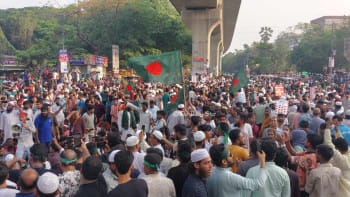Bonded warehouse for all to boost exports: PRI
An effective special bonded warehouse (SBW) benefit, under which exporters can import raw materials without duty, could boost non-garment exports by about $1.5 billion a year, said the Policy Research Institute yesterday.
Shipment of non-garment products fetched $5-7 billion a year between 2012-13 and 2016-17, according to the think-tank.
The country would have got more receipts were there an effective SBW system.
“Tax exemptions via special bonded warehouse boost exports,” said PRI Chairman Zaidi Sattar while presenting a paper titled “Modernisation of SBW scheme to ensure export competitiveness and diversification”.
Discussants at the event held at the PRI office in Dhaka suggested bringing uniformity in bonded warehouse benefits offered to apparel and other export items and faster service from the Customs Bond offices to facilitate exports.
The calls come as the importance of apparel in the export basket continues to soar. It accounted for 82 percent of total export earnings last fiscal year.
Export product diversification continues to be a challenge, Sattar said.
The existing statutory regulatory order that extends SBW benefits to non-garment exporters is selective.
As many as 1,400 products were exported last fiscal year other than apparel by 3,500 firms.
“These firms also have domestic market. Since they are not 100 percent export-oriented, they do not get the benefit,” said Sattar.
He said leakages and abuses are likely, but that should not be a deterrent.
“You should not punish 95 percent of the exporters,” Sattar said, while calling for modernisation and automation of the bonded warehouse facility.
National Board of Revenue Chairman Md Nojibur Rahman said the government has already taken a project for automating the management of the bonded warehouse system. “The automation process has started,” he added.
AFM Shahriar Molla, a member of the NBR for customs export bond and IT, said non-apparel sectors also enjoy bonded warehouse benefit in line with the garment sector.
There is no legal bar for any non-apparel factory from getting a bonded warehouse licence, he said.
Of the total 4,909 bonded warehouse licence holders, 2,062 hail from the non-apparel sectors.
Bangladesh will have to accelerate its export to attain higher economic growth, said AB Mirza Azizul Islam, a former finance adviser to a caretaker government.
“And export diversification is necessary for that. We are heavily dependent on the exports of particular products,” he said, while also calling for bonded warehouse benefits for all sectors to boost shipments.
There are about 750 SROs and most of them are designed to support the garment sector and with limited consideration of other sectors, said Masrur Reaz, senior economist and programme manager of Trade & Competitiveness of the World Bank Group. He recommended enactment of the new customs act and review of the processes for licence issuance.
Asif Ibrahim, former president of the Dhaka Chamber of Commerce and Industry, suggested extension of the facilities enjoyed by apparel sectors to others to diversify export basket.
Md Shafayer Alam Khan, vice-president of the Bangladesh Dyed Yarn Exporters Association, said it took 53 days to renew the licences of some firms in the sector.
“No objection certificate as well as renewals should be issued within a week,” he added.

 For all latest news, follow The Daily Star's Google News channel.
For all latest news, follow The Daily Star's Google News channel. 



Comments